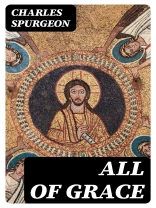In 'All of Grace, ’ Charles Spurgeon, the eminent Victorian preacher, presents a profound exploration of the doctrine of grace through a compelling blend of passionate prose and practical theology. This highly accessible work demystifies the Christian concept of grace, targeting both seasoned believers and those unfamiliar with Christian tenets. Spurgeon’s writing is imbued with a fervent personal conviction, characterized by a conversational tone that invites readers into a deeper understanding of salvation—a cornerstone of Reformed theology. The book is not merely an exposition but an earnest call to experience divine grace, reflecting the theological debates of the 19th century surrounding faith, works, and the nature of God’s mercy. Charles Haddon Spurgeon (1834-1892), known as the 'Prince of Preachers, ’ devoted his life to ministry, preaching to thousands and establishing a formidable literary legacy. His personal experiences of grace, including overcoming adversity in his own life, deeply influenced his theological perspective and motivated him to communicate the life-changing impact of God’s grace. In addition to his preaching, his authorship of numerous works, including 'All of Grace, ’ showcases his theological insights and pastoral heart, making him a significant figure in Christian literature. 'All of Grace’ is a must-read for anyone seeking to understand the depth and breadth of God’s grace. Spurgeon’s ability to articulate complex theological concepts in an approachable manner makes this book not only enlightening but also enriching for spiritual growth. Whether you are wrestling with questions of faith or longing for assurance, this text offers both comfort and challenge, inviting you into a transformative relationship with grace.
O autorze
Charles Haddon Spurgeon, born June 19, 1834, in Kelvedon, Essex, England, stands out in history as one of the most influential preachers of the 19th century. Often known as 'the Prince of Preachers, ’ Spurgeon’s oratory skills and prolific writings have left a substantial legacy in the realm of evangelical Christianity. Beginning his ministry at a young age, Spurgeon was quickly recognized for his remarkable eloquence and passionate sermons which drew large crowds, leading him to become the pastor of the New Park Street Chapel in London. His ministry expanded rapidly, prompting the construction of the Metropolitan Tabernacle which seated thousands. Spurgeon’s theological stance was distinctly Baptist and Calvinist, emphasizing the sovereignty of God in salvation. 'All of Grace’ is among Spurgeon’s most esteemed works, encapsulating his evangelical ethos and commitment to the idea that salvation is gifted by the grace of God alone – a theme pervasive throughout his teachings and writings. His enduring influence is also evident through his other seminal works such as 'Morning and Evening’ and 'The Treasury of David’. His literary legacy is characterized by a blend of simplicity, vigor, and devotional warmth, making his works accessible to laypersons and scholars alike. Spurgeon’s health declined in his later years, but he continued his ministry until his death on January 31, 1892. His works live on, emblematic of his indelible impact on Christian literature and preaching.












